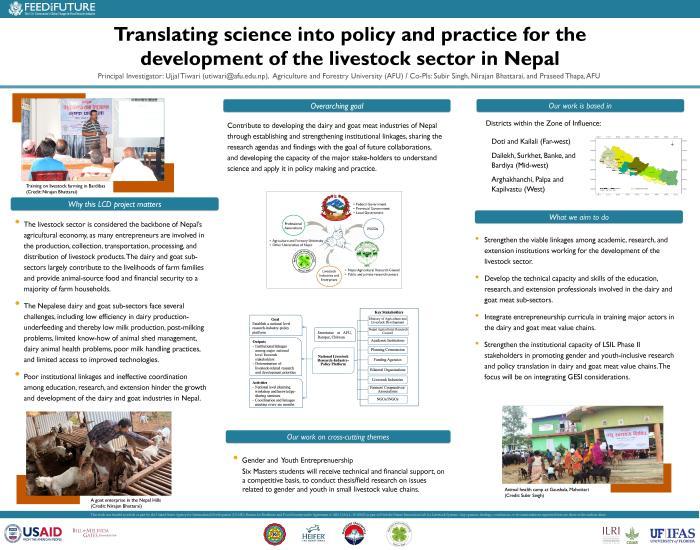Translating science into policy and practice for the development of the livestock sector in Nepal
- Research Project Location: Nepal
- Timeframe: April 2024 - August 2025 (Terminated in February 2025)
- Funding: USAID
Introduction
The livestock sector is considered the backbone of Nepal’s agricultural economy. The dairy and goat sub-sectors largely contribute to the livelihoods of farm families and provide animal-source food and financial security. The Nepalese dairy and goat sub-sectors face several challenges including dairy animal health problems, poor milk handling practices, low efficiency in dairy production, limited know-how of animal shed management and limited access to improved technologies. Poor institutional linkages and ineffective coordination among education, research, and extension hinder the development of the dairy and goat industries in Nepal
Project Goal and Objectives
The goal was to contribute to the development of Nepal’s dairy and goat meat industries by establishing and strengthening institutional linkages, sharing research and findings with the goal of future collaborations, and increasing scientific understanding among stakeholders for practical applications and policy making.
The objectives of the project were to:
- Strengthen the viable linkages among academic, research, and extension institutions working for the development of the livestock sector.
- Develop the technical capacity and skills of the education, research, and extension professionals involved in the dairy and goat meat sub-sectors.
- Integrate entrepreneurship curricula in training major actors in the dairy and goat meat value chains.
- Strengthen the institutional capacity of stakeholders in promoting gender and youth-inclusive research and policy translation in dairy and goat meat value chains. The focus will be on integrating gender equality and social inclusion (GESI) considerations.
Research Approach
The project would contribute to establishing a national research-industry-policy platform that will bring together livestock-related research, education, industry, policymaking, and development institutions. A national-level planning workshop and knowledge-sharing seminar will be conducted in the project's first year. The multi-stakeholder workshops will be conducted in three provinces (Lumbini, Karnali, and SudurPaschim) to strengthen the network among major livestock stakeholders. A website will be set up as a digital platform to share project-related information, event news and technical knowledge for livestock entrepreneurs.
The project would co-develop two livestock economics-related courses at a bachelor’s and master’s level. It will also support the refinement and implementation of training curricula and manuals developed by other projects supported by the Livestock Systems Innovation Lab. The project will also capacitate the university faculty and graduate students through trainings and workshops, particularly on the management of research projects and the enhancement of scientific writing skills.
Principal Investigator (PI) and Lead Institution

Ujjal Tiwari, Agriculture and Forestry University (AFU)
Co-Principal Investigators
Subir Singh, AFU
Nirajan Bhattarai, AFU
Praseed Thapa, AFU
Additional Collaborators
- Gandaki University
- Kathmandu University
- Heifer International
Resources






